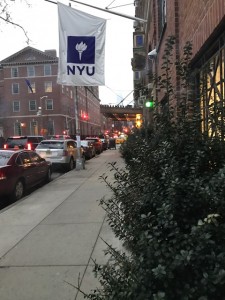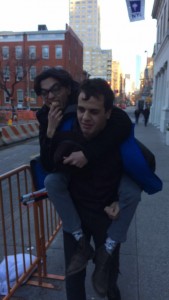Beyond having a primary friend group, cultivating ancillary relationships is beneficial for one’s time in college and outside of it. Of large importance is the relationship one shares with peers and professors within shared academic contexts. From a networking standpoint, the connections made with professors and other students from one’s classes can hold professional significance in the future. From a more present-oriented perspective, those connections can be the difference between one doing poorly in their classes and one succeeding.
Even though a student can be incredibly gifted academically, if they do not know how to be likeable in the eyes of their professors, then they may find that their classes are more difficult than they need to be and that their career prospects might be more restricted. The proverb, “You catch more flies with honey than vinegar,” proves especially true regarding having healthy relationships with professors. I remember in my first semester at NYU having a professor whom I strongly disliked. The professor did not allow for open discussion, opting instead to filter every discussion through themselves and to disregard students with whom they disagreed. It seemed that they were also very openly critical in papers and class discussions about any student who questioned this system. Despite disliking that professor, I never made it readily apparent that I felt this way. By the end of the semester, the professor loved me because I showed them kindness and attentiveness, while other students had given up on the class. This same professor told me that if I would ever need a letter of recommendation, I should not hesitate to ask. In this way, I made myself less of a target for harsh grading and allowed professor’s status to serve to my benefit. The same rule of kindness and attentiveness can apply to teachers one genuinely likes (most of my professors at NYU), the only difference being that the relationship in these cases is easier and more genuine.
As for peers, it is not necessary to be friends with them much outside of the academic context to still reap the benefits of an academic relationship. Sure, forming studying groups can be especially helpful for reviewing material and covering gaps in knowledge before exams, but there are greater benefits to having friends in class. For core classes, many students are not as interested in the subject matter as much as they will be when they take more self-directed, specialized courses later in their academic career. Core classes provide a helpful platform for students to network with students from a broader range of interests than specialized courses do, since every student usually must complete certain core requirements to complete their major. It is then possible under such circumstances that a student may find themselves in a class with both science and humanities majors. By forming symbiotic in-class relationships with other students possessing diverse interests, one may find connections that could inevitably benefit them outside of college, when their career could benefit from the help of someone from a different discipline entirely. For instance, a computer science major could benefit from the help of someone in finance when calculating the costs for a tech startup down the road. Who knows, some of the friends one may find in such classes could also develop into relationships beyond the academic sphere.
For more specialized courses, one may use such courses as grounds for honing their craft with other like-minded individuals. In my case, I have been taking workshop classes in creative writing to enhance my poetry. In this environment, I have used classroom discussions as grounds to both learn how to enhance my art and provide new insight on the work of others. In the future, some of the people with whom I shared such classes could help me in developing and editing my future work. What’s more, those same people could become partners in collaborative artistic projects. Yet, if I never made the effort to reach out to my peers, I would not have the same opportunities that I have now.
By Matthew Evert
Matthew Evert is a Campus Clipper publishing intern who is studying English and Philosophy as a sophomore at NYU. Passionate about poetry, people, and adventure, Matthew aspires to live an explorative and artistic life. For over 20 years, the Campus Clipper has been offering awesome student discounts in NYC, from the East Side to Greenwich Village. Along with inspiration, the company offers students a special coupon booklet and the Official Student Guide, which encourage them to discover new places in the city and save money on food, clothing and services.
At the Campus Clipper, not only do we help our interns learn new skills, make money, and create wonderful e-books, we give them a platform to teach others. Check our website for more student savings and watch our YouTube video showing off some of New York City’s finest students during the Welcome Week of 2015.
Tags: academic relationships, learning, networking, students, teachers



